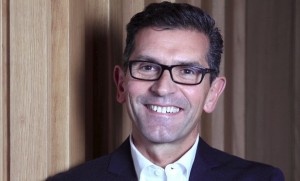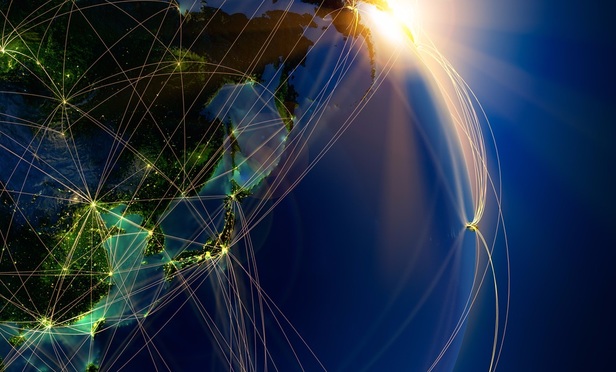'There will be lawsuits' – firms size up Trump impact on Asia business
Law firm leaders say post-election policy changes could result in more Asia work
November 14, 2016 at 05:39 AM
6 minute read
US President-elect Donald Trump forged a path to the White House partly on a platform of upending US trade agreements and taxing imports to keep jobs from leaving the country.
As a candidate, he said he would impose a 45% tariff on Chinese goods and declare China a currency manipulator, and he threatened to withdraw the US from the World Trade Organisation (WTO). Economists have warned that these actions would set off trade wars, hurting US exports and sending prices for goods in the US soaring.
For US-based law firms with significant Asia practices and offices, the question is whether Trump will follow through. But even if his administration adopts a protectionist stance that constrains global trade, law firm leaders say policy changes would result in more work for firms with trade practices – and would have little effect on transactional work.
 "I would expect there to be more opportunity for international law firms in Asia, at least in the short term," says Roger Parker, managing partner of Reed Smith's Asia-Pacific branch (pictured). Uncertainty about US motives and the administration's potential actions will drive clients to seek out their lawyers, he suggests.
"I would expect there to be more opportunity for international law firms in Asia, at least in the short term," says Roger Parker, managing partner of Reed Smith's Asia-Pacific branch (pictured). Uncertainty about US motives and the administration's potential actions will drive clients to seek out their lawyers, he suggests.
Parker adds that while he hopes the US will stay fully engaged in Asia, a protectionist Trump administration would only increase the determination of the UK and Europe "to keep the force of globalisation moving".
Duane Layton, head of Mayer Brown's government and global trade group in Washington DC, says that two clients have already called to ask what the president can unilaterally do to change trade agreements and raise tariffs.
"They are going to look for statutory authority for the president to unilaterally, or any way he can, raise tariffs on imports," Layton says of the Trump administration lawyers. "That of course is going to lead to, presumably, lawsuits. There are going to be Chinese exporters and their US importers challenging those tariffs."
Layton predicts that lawyers on the ground in the firm's Asia offices, as well as those that represent clients before the WTO in Geneva and before the US Department of Commerce and the US International Trade Commission in Washington DC, will be busy as a result. "Change causes the need for legal advice," he says.
Bruce Heiman, the co-head of K&L Gates' policy and regulatory practice, agrees that Chinese companies seeking to export to or invest in the US will need extra legal guidance. "The next four years will be a time of more difficult US-China relations; the movement of goods, capital and people between China and the US will be more restricted and the potential for conflict will increase," Heiman says.
The risk factor is a bit like Brexit. It causes people to pause and think
Most capital markets lawyers, meanwhile, do not see a Trump presidency bringing any direct short-term effect. Stock markets across Asia recovered quickly on Thursday (10 November), following the fall a day earlier as the ballots were counted.
"The market doesn't like uncertainty," says a Hong Kong-based international firm partner. "But as soon as the dust settled, it went back to normal."
Another Hong Kong partner with a US firm cautioned that listings by companies in certain industries could be affected by specific policies, but that's difficult to predict before the new administration starts.
Chinese outbound M&A will continue. Wilson Sonsini Goodrich & Rosati China head Weiheng Chen says that clients' pursuit of overseas assets is often commercially driven and tends not to be influenced by politics.
One possible challenge, Chen notes, could be that the Committee on Foreign Investment in the US is going to be more conservative, and that could result in a more challenging review process for Chinese investors.
But Chen says the US will likely continue to be an attractive investment destination for companies in the technology, healthcare and consumer sectors.
 Baker & McKenzie chairman Paul Rawlinson (pictured), who took over the position from Eduardo Leite last month, expresses hope that the US would not disengage with Asia. He adds that volatility as a result of changing geopolitical realities is nothing new.
Baker & McKenzie chairman Paul Rawlinson (pictured), who took over the position from Eduardo Leite last month, expresses hope that the US would not disengage with Asia. He adds that volatility as a result of changing geopolitical realities is nothing new.
"President-elect Trump's views on trade are one area that our clients will want us to watch closely, but it is too soon to say what the impact will be on NAFTA or other agreements," Rawlinson says in a statement. "However, we hope we don't see a retreat into an overtly protectionist America – as we would say for any major market internationally."
Mostly, firms have no choice but to watch and wait.
"They don't know what his real programme is and what the relationship with the Republican House is going to be," says former Clifford Chance managing partner Tony Williams, a principal at London legal consultancy Jomati Consultants. Traditionally, free trade has been a cornerstone of the Republican Party platform and it's unclear whether a Republican-controlled Congress will pull back from that stance now that Trump is its standard-bearer.
"The risk factor there is a bit like Brexit," says Williams, noting that the UK's vote to leave has been followed by a period of uncertainty. "It just causes people to pause and think a bit."
Most US law firms advise on transactional work in Asia, where they represent clients looking to do work in the emerging economies there, as well as foreign clients that wish to invest in or trade with the US, UK and European countries. Squire Patton Boggs, Ropes & Gray and Kirkland & Ellis have tripled their Asia-based lawyer headcounts in the past five years, while Morgan Lewis & Bockius grew from 10 to 90 lawyers during that time, largely through its mass hire of lawyers from now-defunct Bingham McCutchen.
Baker & McKenzie is one of the firms with the largest practices in Asia, with more than 700 lawyers in Tokyo, Singapore, Hong Kong, Jakarta and other cities. Most firms at the top of the Am Law 100 opened Asia offices during or prior to the Obama administration, though some have pulled out of the continent within the past year.
Fried Frank Harris Shriver & Jacobson closed its offices in Hong Kong and Shanghai last January, the same week that Dentons announced its decision to merge with China's Dacheng to create the world's largest law firm. In July 2015, Chadbourne & Parke closed its one-lawyer Beijing office, ending its presence in Asia. And earlier this year, Cadwalader Wickersham & Taft announced it would pull out of the continent by closing its Beijing and Hong Kong offices.
This content has been archived. It is available through our partners, LexisNexis® and Bloomberg Law.
To view this content, please continue to their sites.
Not a Lexis Subscriber?
Subscribe Now
Not a Bloomberg Law Subscriber?
Subscribe Now
NOT FOR REPRINT
© 2025 ALM Global, LLC, All Rights Reserved. Request academic re-use from www.copyright.com. All other uses, submit a request to [email protected]. For more information visit Asset & Logo Licensing.
You Might Like
View All
DeepSeek and the AI Revolution: Why One Legal Tech Expert Is Hitting Pause
4 minute read
What Happens When a Lateral Partner's Guaranteed Compensation Ends?

Lawyers React To India’s 2025 Budget, Welcome Investment And Tax Reform

Russia’s Legal Sector Is Changing as Western Sanctions Take Their Toll
5 minute readTrending Stories
- 1States Accuse Trump of Thwarting Court's Funding Restoration Order
- 2Microsoft Becomes Latest Tech Company to Face Claims of Stealing Marketing Commissions From Influencers
- 3Coral Gables Attorney Busted for Stalking Lawyer
- 4Trump's DOJ Delays Releasing Jan. 6 FBI Agents List Under Consent Order
- 5Securities Report Says That 2024 Settlements Passed a Total of $5.2B
Who Got The Work
J. Brugh Lower of Gibbons has entered an appearance for industrial equipment supplier Devco Corporation in a pending trademark infringement lawsuit. The suit, accusing the defendant of selling knock-off Graco products, was filed Dec. 18 in New Jersey District Court by Rivkin Radler on behalf of Graco Inc. and Graco Minnesota. The case, assigned to U.S. District Judge Zahid N. Quraishi, is 3:24-cv-11294, Graco Inc. et al v. Devco Corporation.
Who Got The Work
Rebecca Maller-Stein and Kent A. Yalowitz of Arnold & Porter Kaye Scholer have entered their appearances for Hanaco Venture Capital and its executives, Lior Prosor and David Frankel, in a pending securities lawsuit. The action, filed on Dec. 24 in New York Southern District Court by Zell, Aron & Co. on behalf of Goldeneye Advisors, accuses the defendants of negligently and fraudulently managing the plaintiff's $1 million investment. The case, assigned to U.S. District Judge Vernon S. Broderick, is 1:24-cv-09918, Goldeneye Advisors, LLC v. Hanaco Venture Capital, Ltd. et al.
Who Got The Work
Attorneys from A&O Shearman has stepped in as defense counsel for Toronto-Dominion Bank and other defendants in a pending securities class action. The suit, filed Dec. 11 in New York Southern District Court by Bleichmar Fonti & Auld, accuses the defendants of concealing the bank's 'pervasive' deficiencies in regards to its compliance with the Bank Secrecy Act and the quality of its anti-money laundering controls. The case, assigned to U.S. District Judge Arun Subramanian, is 1:24-cv-09445, Gonzalez v. The Toronto-Dominion Bank et al.
Who Got The Work
Crown Castle International, a Pennsylvania company providing shared communications infrastructure, has turned to Luke D. Wolf of Gordon Rees Scully Mansukhani to fend off a pending breach-of-contract lawsuit. The court action, filed Nov. 25 in Michigan Eastern District Court by Hooper Hathaway PC on behalf of The Town Residences LLC, accuses Crown Castle of failing to transfer approximately $30,000 in utility payments from T-Mobile in breach of a roof-top lease and assignment agreement. The case, assigned to U.S. District Judge Susan K. Declercq, is 2:24-cv-13131, The Town Residences LLC v. T-Mobile US, Inc. et al.
Who Got The Work
Wilfred P. Coronato and Daniel M. Schwartz of McCarter & English have stepped in as defense counsel to Electrolux Home Products Inc. in a pending product liability lawsuit. The court action, filed Nov. 26 in New York Eastern District Court by Poulos Lopiccolo PC and Nagel Rice LLP on behalf of David Stern, alleges that the defendant's refrigerators’ drawers and shelving repeatedly break and fall apart within months after purchase. The case, assigned to U.S. District Judge Joan M. Azrack, is 2:24-cv-08204, Stern v. Electrolux Home Products, Inc.
Featured Firms
Law Offices of Gary Martin Hays & Associates, P.C.
(470) 294-1674
Law Offices of Mark E. Salomone
(857) 444-6468
Smith & Hassler
(713) 739-1250









